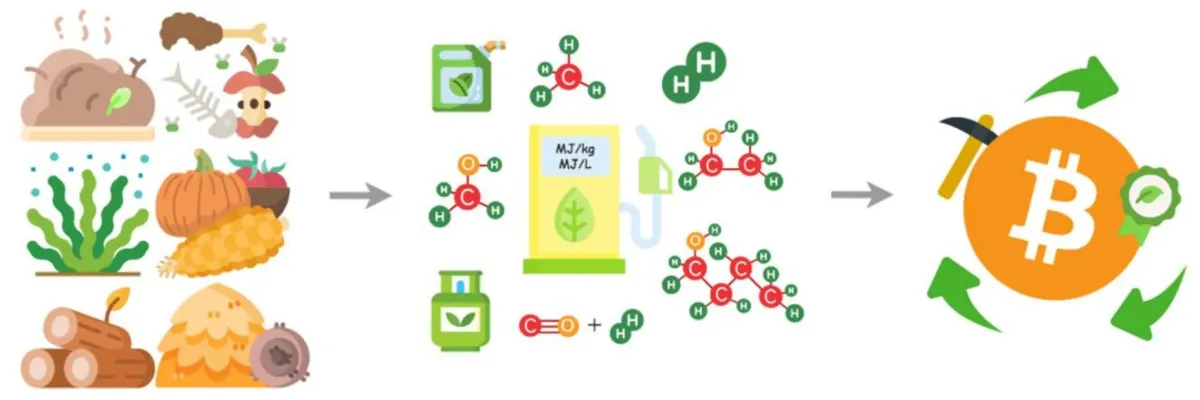Integrating Bitcoin Mining into Biorefineries: Enhancing Economic Viability and Sustainability
Full article summary: Semaan, G., Wang, G., Vo, Q.S., Kumar, G., 2024. The potential relationship between biomass, biorefineries, and Bitcoin. Sustainability 16, 7919.

The top part of this Research Review has a detailed summary of the article; scroll farther down the page for important research needs and ideas about the article's broader Bitcoin-related implications.
Article Summary
Link

Keywords/phrases
- Integration of Bitcoin mining into biorefineries
- Economic sustainability of biorefineries
- Biomass and biofuel production
- Diversification of revenue streams in biorefineries
- Impact of Bitcoin on bio-based product pricing
- Renewable energy and Bitcoin mining
- Carbon-neutral bioenergy solutions
- Enhancing biorefinery profitability with Bitcoin
- Policy implications for biorefinery integration
- Technological advancements in biorefineries
Summary
The integration of Bitcoin mining into biorefineries presents an innovative approach to improve the economic viability of bio-based products. By utilizing excess bioenergy for Bitcoin mining, biorefineries can diversify their revenue streams and offset production costs , potentially transforming the financial dynamics of the bio-based products market. This dual-purpose strategy supports the broader use of renewable energy, enhances biorefinery profitability, and aligns with sustainable development goals, although it requires careful management of technological, economic, and regulatory challenges.
"Merging biorefineries with Bitcoin mining suggests a cautiously optimistic outlook and represents a promising yet challenging leap towards creating cost-effective, long-term, viable, and sustainable technologies."
Take-Home Messages
- Economic Viability: Integrating Bitcoin mining into biorefineries offers a novel approach to enhance profitability by diversifying revenue streams through digital asset production.
- Energy Optimization: Efficient energy management is crucial for balancing the needs of biofuel production and Bitcoin mining, ensuring sustainable operations.
- Policy Support: Developing clear regulatory frameworks is essential for facilitating the integration of Bitcoin mining into biorefineries while ensuring compliance with environmental standards.
- Technological Advancements: Continued innovation in mining hardware and energy systems will be critical to maximizing the profitability and sustainability of this integration.
- Sustainability Impact: Leveraging excess bioenergy for Bitcoin mining supports renewable energy adoption and aligns with global sustainability goals, presenting a compelling case for industry stakeholders.
Overview
Biorefineries convert biomass into biofuels and other value-added products, offering sustainable alternatives to fossil fuels, but they often face commercialization challenges due to high operational costs and market competition. Integrating Bitcoin mining into biorefineries is proposed as a solution, using excess bioenergy to generate additional revenue through Bitcoin production. This approach supports financial sustainability and helps lower bio-based product costs, enhancing market competitiveness.
The article evaluates various biomass and biofuels for their potential use in Bitcoin mining, identifying biohydrogen and biomethane as particularly effective for generating electricity due to their high energy content. Advanced energy management and conversion systems, such as internal combustion engines, microturbines, and fuel cells, are highlighted as crucial for optimizing this integration. Selecting the right combination of biofuels and energy systems is essential for maximizing profitability while maintaining stability and sustainability.
The integration also has broader policy and regulatory implications. Clear guidelines and supportive policies are needed to navigate the regulatory landscape and facilitate adoption. Collaboration among industry stakeholders, policymakers, and researchers is crucial to overcoming these challenges and establishing a sustainable path for biorefineries integrating Bitcoin mining.
Implications
For biorefineries, this approach provides a way to boost profitability and financial sustainability by diversifying income streams. Investors benefit from reduced reliance on volatile biofuel markets and a hedge against market fluctuations, while policymakers can promote renewable energy use in mining, aligning with broader sustainability goals.
However, successful implementation requires addressing technological, economic, and regulatory barriers. Advances in energy management and cooling systems are essential for efficient Bitcoin mining operations within biorefineries. A thorough understanding of the cost-benefit dynamics is crucial for making informed investment decisions. Supportive regulatory frameworks are also needed to facilitate integration while ensuring compliance with environmental standards.
Five Key Research Needs
- Economic Feasibility Analysis. Understanding the cost-benefit dynamics is critical to determining the economic viability of integrating Bitcoin mining into biorefineries. Research should focus on developing comprehensive financial models that account for capital expenditures, operational costs, and potential revenue from mining. This analysis would provide clear benchmarks for profitability, helping stakeholders make informed investment decisions (n.b., we recently used that approach for modeling landfill waste gas mining - Rudd et al. 2024).
- Energy Optimization Strategies. Efficient energy management is pivotal for the successful integration of Bitcoin mining into biorefineries. Research is needed to identify optimal energy allocation strategies that balance the energy demands of both production and mining operations. By improving energy efficiency, biorefineries can reduce costs and enhance the overall sustainability of their operations.
- Policy and Regulatory Framework Development. To facilitate the integration of Bitcoin mining, there is a need for research into policy and regulatory frameworks that support biorefineries in navigating legal challenges. This includes developing guidelines that harmonize regional regulations and promote sustainable practices in Bitcoin mining. Such frameworks would help mitigate regulatory risks and create a supportive environment for innovation.
- Technological Advancements in Mining and Energy Systems. Research should prioritize the development of advanced technologies that enhance the compatibility and efficiency of Bitcoin mining within biorefineries. This includes innovations in cooling systems, energy conversion technologies, and mining hardware. Advancing these technologies could lower operational barriers and increase the feasibility of integrating mining operations.
- Public Engagement and Perception Management. Addressing public perception is essential for the broader acceptance of integrating Bitcoin mining into biorefineries. Research is needed to explore effective communication strategies that highlight the environmental and economic benefits of this integration. By engaging with the public and stakeholders transparently, biorefineries can build support and mitigate concerns over environmental impact.
Broader Implications
Economic Viability of Biorefineries
Integrating Bitcoin mining into biorefineries can enhance economic viability by using excess bioenergy for mining, creating an additional revenue stream to offset production costs. This approach reduces the breakeven point for bio-based products, making them more competitive and attractive to investors, thereby supporting the growth of the bioeconomy.
Renewable Energy Adoption
This integration promotes renewable energy use, addressing environmental concerns associated with Bitcoin mining. By using bioenergy, biorefineries can help reduce the carbon footprint of mining.
Enhancing the Circular Economy
This model supports the circular economy by maximizing biomass use and reducing waste. By turning residual bioenergy into value through Bitcoin mining, biorefineries can enhance resource efficiency and contribute to a sustainable industrial ecosystem.
Risk Management and Market Stability
Diversifying revenue streams through Bitcoin mining can help biorefineries hedge against biofuel market volatility. However, managing Bitcoin's own volatility will require effective risk management strategies to maintain financial stability.
Global Implications for Bitcoin and Bio-Based Industries
On a global scale, integrating Bitcoin mining with biorefineries could influence both industries by promoting sustainable practices and enhancing the competitiveness of bio-based products. This approach has the potential to drive broader adoption of renewable energy and innovative industrial models.




Comments ()